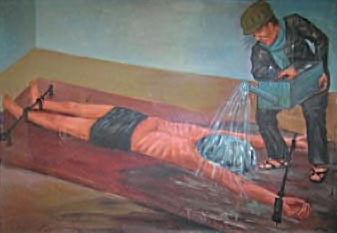Let us see who used waterboarding in the past:
Algeria
The technique was also used during the Algerian War (1954-1962). The French journalist Henri Alleg, who was subjected to waterboarding by French paratroopers in Algeria in 1957, is one of only a few people to have described in writing the first-hand experience of being waterboarded. His book The Question, published in 1958 with a preface by Jean-Paul Sartre (and subsequently banned in France until the end of the Algerian War in 1962) discusses the experience of being strapped to a plank, having his head wrapped in cloth and positioned beneath a running tap:
The rag was soaked rapidly. Water flowed everywhere: in my mouth, in my nose, all over my face. But for a while I could still breathe in some small gulps of air. I tried, by contracting my throat, to take in as little water as possible and to resist suffocation by keeping air in my lungs for as long as I could. But I couldn't hold on for more than a few moments. I had the impression of drowning, and a terrible agony, that of death itself, took possession of me. In spite of myself, all the muscles of my body struggled uselessly to save me from suffocation. In spite of myself, the fingers of both my hands shook uncontrollably. "That's it! He's going to talk," said a voice.
The water stopped running and they took away the rag. I was able to breathe. In the gloom, I saw the lieutenants and the captain, who, with a cigarette between his lips, was hitting my stomach with his fist to make me throw out the water I had swallowed.
Alleg stated that he had not broken under his ordeal of being waterboarded. Alleg has stated that the incidence of "accidental" death of prisoners being subjected to waterboarding in Algeria was "very frequent."
Vietnam
Waterboarding was designated as illegal by U.S. generals in the Vietnam War. On January 21, 1968, The Washington Post published a controversial photograph of two U.S soldiers and one South Vietnamese soldier participating in the waterboarding of a North Vietnamese POW near Da Nang. The article described the practice as "fairly common." The photograph led to the soldier being court-martialled by a U.S. military court within one month of its publication, and he was discharged from the army. Another waterboarding photograph of the same scene is also exhibited in the War Remnants Museum at Ho Chi Minh City.
 Chile
Chile
Based on the testimonies from more than 35,000 victims, of the Pinochet regime, the Chilean Commission on Political Imprisonment and Torture concluded that to provoke a near death experience, by waterboarding, is torture.
Khmer Rouge
The Khmer Rouge at the Tuol Sleng prison in Phnom Penh, Cambodia, used waterboarding as a method of torture between 1975 and 1979. The practice was documented in a painting by former inmate Vann Nath, which is on display in the Tuol Sleng Genocide Museum.
 U.S. Military survival training
U.S. Military survival training
All special operations units in all branches of the U.S. military employ the use of waterboarding as part of survival school (SERE) training, to psychologically prepare soldiers for the eventuality of being captured by the enemy forces.
Jane Mayer wrote for The New Yorker:
According to the sere affiliate and two other sources familiar with the program, after September 11th several psychologists versed in sere techniques began advising interrogators at Guantánamo Bay and elsewhere. Some of these psychologists essentially “tried to reverse-engineer” the sere program, as the affiliate put it. “They took good knowledge and used it in a bad way,” another of the sources said. Interrogators and bsct members at Guantánamo adopted coercive techniques similar to those employed in the sere program.[43]
and continues to report:
many of the interrogation methods used in sere training seem to have been applied at Guantánamo.
Seems the US though it was wrong in the past and surprise, surprise they were fighting a war at some of those times, like Vietnam and what's that, it was illegal then, so being in a war and war not being a 'nice' thing seems to be even more of a flimsy argument than they were before.